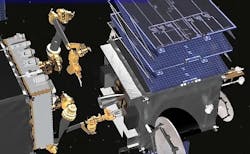DARPA considers re-launching project to develop a space robot to repair and upgrade orbiting satellites
Officials of the U.S. Defense Advanced Research Projects Agency (DARPA) in Arlington, Va., announced an industry survey last week (DARPA-SN-19-29) to find companies willing to participate in a renewed Robotic Servicing of Geosynchronous Satellites (RSGS).
DARPA launched the RSGS in 2016 to create a dexterous robotic capability able to provide persistent robotic servicing capabilities in GEO -- the orbit 22,000 miles above the Earth's surface in which geostationary satellites operate.
DARPA had been working with Maxar Technologies in Westminster, Colo., on the RSGS project, but Maxar officials have told DARPA they want to terminate their participation due to financial reasons.
Related: DARPA kicks off RSGS program to build a space robot to maintain geosynchronous satellites
Now DARPA is looking to recompete or restructure the program to develop the RSGS spacecraft bus and integrate the resulting robotic servicing spacecraft with the launch vehicle, as well as provide mission operations center and staff over the mission duration.
Significant progress on the robotic payload for satellite repair and upgrade has been made, DARPA officials say, including initiating manufacture of the flight versions of the robotic manipulator arms. The design of the robotic payload is expected to be adaptable to a variety of potential spacecraft buses.
The program seeks to create a robotic servicer operated by a commercial company, and ultimately establish a reliable, cost-effective GEO satellite servicing presence, DARPA officials say.
DARPA experts would like a U.S. space industry team to build, own, and operate a robotic servicing vehicle in or near GEO. This space vehicle will integrate a government-provided payload, provide communications with the ground, and operate the vehicle commercially for many years.
Related: DARPA continues program to reuse parts from orbiting dead satellites
The idea is for the servicing robot owner to be able to make money by servicing commercial and government GEO satellites, DARPA officials say. Most damaged or disabled spacecraft operating in GEO are not recoverable or fixable, and often are left to drift uselessly in space.
Robotic GEO servicing capabilities should include inspecting functional spacecraft with anomalies; correcting mechanical problems like solar array and antenna malfunctions; moving satellites to different orbits; fixing malfunctioning propulsion systems; and upgrading satellites with new capabilities.
The target date to launch the robotic servicer on a government-furnished rocket to or near GEO for demonstration is spring 2021 to validate the robotic servicer's readiness for commercial use.
Related: Power in space: what is the most critical system in a spacecraft?
The RSGS robotic payload consists of a pair of 2-meter, 7-degree of freedom robotic arms with tool changers; tools; control systems like electronics, software, machine vision, and control algorithms; cameras and lights; a payload power-distribution system; high-resolution imaging sensors; and RPO sensors.
Companies interested in becoming partners with DARPA on a revamped RSGS project should email responses no later than 22 Feb. 2019 to [email protected]. Email questions or concerns to DARPA at [email protected].
More information is online at http://www.fbodaily.com/archive/2019/02-February/08-Feb-2019/FBO-05214130.htm.
Ready to make a purchase? Search the Military & Aerospace Electronics Buyer's Guide for companies, new products, press releases, and videos
